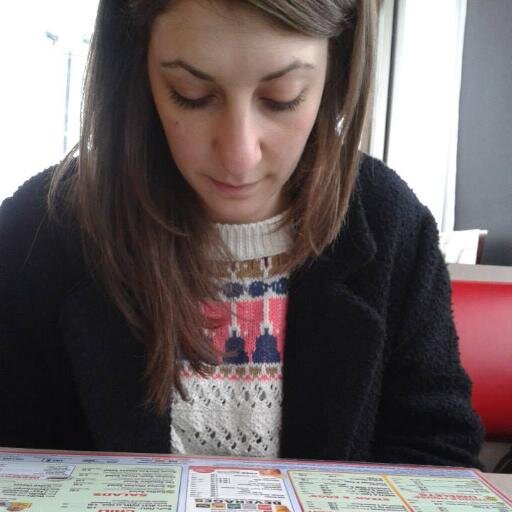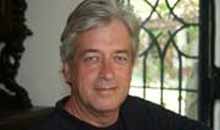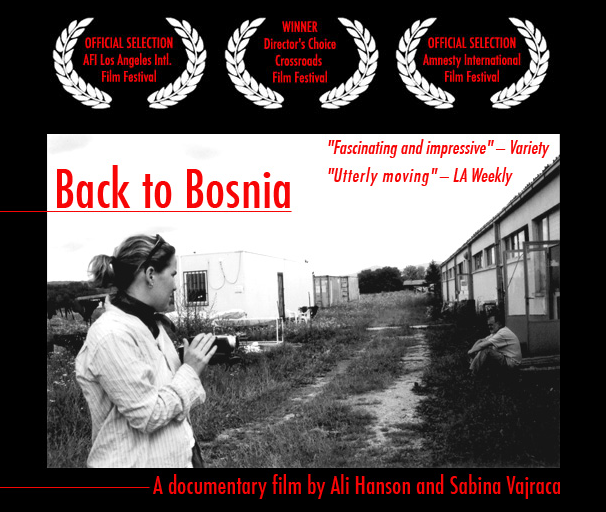Paul Woolwich - Head of Audio/Visual Amnesty UK
Paul admitted that he'd actually had nothing to do with the making of the film 'Life in the Camps' as he'd only been head of Audio Visual at Amnesty for two months! However, he did let us all in on Amnesty's plans going forward. Amnesty International have 160 offices worldwide, with 35 different youtube channels. 'Life in the Camps' was made by the UK offices, who now have decided on their campaign themes for the year ahead. The first - 'My Body, My Rights' - covering women's rights, gay marriage and anything else that fits the theme. The second, is 'torture', which they have been campaigning for 50yrs to ban. So, if any of you are thinking of making content on these themes, Amnesty might be onboard to offer a helping hand - worth a try!
He then went on to say that the films Amnesty make are all in tune with their role as advocates of peace and equality. People watch a film, they are moved, they are affected but the telling of a good film is in the action that follows it. Whether people DO SOMETHING or not. He says he wanted to make films that aim to make the world a better place, so that it's not 'Who Cares' but rather, an issue is personalised in a way that makes people care and do something. Paul also told us of a previous campaign that did just that, where Amnesty encouraged people to write letters to their government telling them to free Prisoners of Conscience. http://www.amnestyusa.org/our-work/cases The response was amazing.
Lucy Tcherniak - Co-writer of 'The Truth About Stanley'
Lucy was asked why she chose to write the Truth about Stanley and why she approached homelessness as a subject.
Lucy told us that she wrote the film two and a half years ago. It began with her and her friends walking down the street and seeing homeless people asleep in doorways and suddenly she asked herself, 'what happens when homeless people die on the street?'
Research found that there was no distinctive answer. So she began to write. It was not her intention to approach the Big Issue, but it became a very sensible thing to do once the film developed. She began researching into those who created imaginative truths for nicer endings to their stories. Something that is actually quite common for those who have had a trauma in their past, which is common among the homeless.
The thing I loved about the film, was that it treated Stanley as a person, not as a 'homeless man'. We also saw how easy it is for any one of us to find ourselves in the same situation as Sam runs away from home. It was very 'human', if that's even a descriptive term. Particularly in the scenes in Covent Garden, we saw genuine reactions from the public to Stanley's behaviour, which makes us almost ashamed that we might react in that way too. Very clever directing to place the cameras out of sight to capture this.
It seems very in tune with what Lucy set out to do in the first place. It began as just a drama. They wanted to create characters that would encourage an emotional response. Lucy wanted people to care, 100,000+ views later, I think she succeeded.
Check out her website for more of her beautiful work: http://www.lucytcherniak.com/
Fred Branson - Co-Founder of Amantani
Fred Branson began his charity work in an orphanage in Cuzco, Peru. Whilst there he was astounded at just how many of the orphans came from indigenous backgrounds (approx 80%) which sparked a spirit inside him for a new path.
The path took him to the creation Amantani who now work among indigenous Peruvian communities giving them education and support where needed. Part of their work includes the running of three boarding houses that help those children who trek a gruelling 4hours just to get to school.
Then he came on to 'Meet My World' where he asked 12 Peruvian children to write their own scripts to show the positive things within their communities. He furthered that the process took 12months to unfold, with him working closely with the children themselves to get their message across to people like us, who live in a completely different culture where values lie in capital rather than in community. Fred was questioned about the use of mainstream music for the trailer, over a Peruvian track and his reply was that he wanted to make it relevant. If no-one could connect with the subject matter, the children or the things they are talking about, then at least they might connect with the music choice.
He also furthered that, alike to Survival International's story, in Peru companies look to try to help indigenous communities by turning lakes into fresh water reservoirs for drinking and mountains into mines not realising that al of these are sacred to the people who live there. So if you're interested in that for a story, then you know where to go!
I thought 'Meet My World' was a great idea. Not only is Peru somewhere I have wanted to travel to for over 5 years, the passion of the children and indeed Fred, for their culture makes the 12 films, films I want to watch!
Here's the Amantani website: http://www.amantani.org.uk/about-us1
Time to Mingle
Perhaps the most useful part of the evening for an aspiring producer, although the rest was certainly inspiring, was speaking to some of the attendees afterwards. I approached Fred to get details on whether I could do anything useful to help, during my tour of Peru when we go sometime next year. I then spoke to Paul Woolwich about his career in documentary filmmaking and asked his advice on how exactly I get myself known to people. Amongst his profound cynicism (meant in the best way possible) there were a few home-truths in his rather dated ethos to the business. For example, his question of why I care about factual production in terms of broadcasting was certainly something I hadn't thought about. He instead directed me online: you want to make factual content, do it online. A dog running into a glass door gets how many hits on youtube - from his editorial days on Panorama Paul shared that Panorama gets around 3million. So launching something online is likely to bring more views... Very good point.
Although I'm not sure I completely agree with his notion of 'there's no future in factual television at all'. Neither did I necessarily agree that to get a foot in the door you have to allow people to steal your ideas nor that no everyday man cares about the 'propaganda' films as he described the films at the festival. He did agree that the production companies I have set my sights on for the future were good choices though - Windfall Productions and October Films being among them - so at least there was reassurance alongside the challenging question of why should people care about MY documentary, how is it relatable? Fair point but a challenging one for a Monday evening! Thanks Paul!
Then arrived a fellow young - I say young but of course everyone is much my age superior -
producer/director from New York, Sabina Vajraca, whose prior projects include 'Back to Bosnia' which I'm still waiting to receive the link to watch! It sounded like a documentary I'd really love to watch particularly as it resonates with my documentary 'After Auschwitz' and the theme of fleeing genocide. Perhaps the thing that resonated with me personally was the fact that she had filmed the documentary within the 20days holiday she was allowed from her full-time job. Of course, with my new job I am in a similar situation but it made me realise I need to stop being lazy, wasting time being tired and get stuck in! So, ideas are now currently in development for the months to follow, so thanks for the advice Sabina! Needless to say I'd love to lend a helping hand if contributors are needed in the UK for future projects.
Although I'm not sure I completely agree with his notion of 'there's no future in factual television at all'. Neither did I necessarily agree that to get a foot in the door you have to allow people to steal your ideas nor that no everyday man cares about the 'propaganda' films as he described the films at the festival. He did agree that the production companies I have set my sights on for the future were good choices though - Windfall Productions and October Films being among them - so at least there was reassurance alongside the challenging question of why should people care about MY documentary, how is it relatable? Fair point but a challenging one for a Monday evening! Thanks Paul!
Then arrived a fellow young - I say young but of course everyone is much my age superior -
producer/director from New York, Sabina Vajraca, whose prior projects include 'Back to Bosnia' which I'm still waiting to receive the link to watch! It sounded like a documentary I'd really love to watch particularly as it resonates with my documentary 'After Auschwitz' and the theme of fleeing genocide. Perhaps the thing that resonated with me personally was the fact that she had filmed the documentary within the 20days holiday she was allowed from her full-time job. Of course, with my new job I am in a similar situation but it made me realise I need to stop being lazy, wasting time being tired and get stuck in! So, ideas are now currently in development for the months to follow, so thanks for the advice Sabina! Needless to say I'd love to lend a helping hand if contributors are needed in the UK for future projects.
 |
| Jenny Horwell |
My final conversation of the evening was with Jenny Horwell from DocHouse who screen a documentary a week across London venues. If you're interested in applying or attending screenings, here's the link! http://www.dochouse.org/
I approached Jenny as my documentary rarely falls into the category of short length or feature length. It was reassuring to hear that Jenny had no qualms about screening two mid-length films back to back if they had relating themes. So the plan ahead? To find a partner to screen my film with!
'After Auschwitz' in short, runs at just under 60mins. The doc tells the harrowing stories of holocaust survivors Susan Pollack, born in Budapest and Freddie Knoller, born in Vienna, as well as touching upon the story of Zigi Shipper. We then move on to explain the relevance of the holocaust as an example of advocacy against discrimination and violence today. It explores issues such as the violence towards immigrants by the Golden Dawn in Greece, modern anti-semitism in Hungary and the mis-treatment of Roma communities in central Europe.
Any recommendations for other films with similar themes, then please get in touch! My website has my contact details as well as a page dedicated to explaining more about my film 'After Auschwitz'.
www.katmace.co.uk
To Round-Off
www.katmace.co.uk
To Round-Off
'Inspiring Change' at #LABFFF was a night that left me more confused about my future than when I had entered. But at the same time it had clarified so much... Does that even make sense? It reminded me that factual productions are most definitely my future. I'm no good at entertainment or reality, it's factual I care about. The confusion comes with my love for people. I want to help people, I want to tell their stories but is that documentary film/making or is it (as Paul put it) propaganda? Either way, I know I now want to spring to action and save for a camera of my own so I can make lots of short form docs in my spare time. We'll see how long that one takes before I think beyond that, but there are some exciting stories to come!!!
Let's All Be Free - what a wonderful concept. The evening left us with the question: What does freedom mean to you? To be honest I don't know, but I do know that the freedom to have ideas and the power to make them happen, is a freedom I can scarcely find a comparison to!
Let's All Be Free - what a wonderful concept. The evening left us with the question: What does freedom mean to you? To be honest I don't know, but I do know that the freedom to have ideas and the power to make them happen, is a freedom I can scarcely find a comparison to!






No comments:
Post a Comment